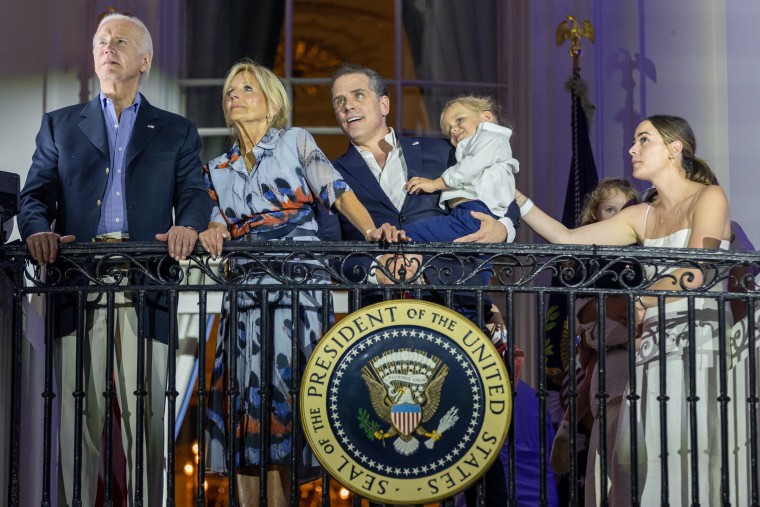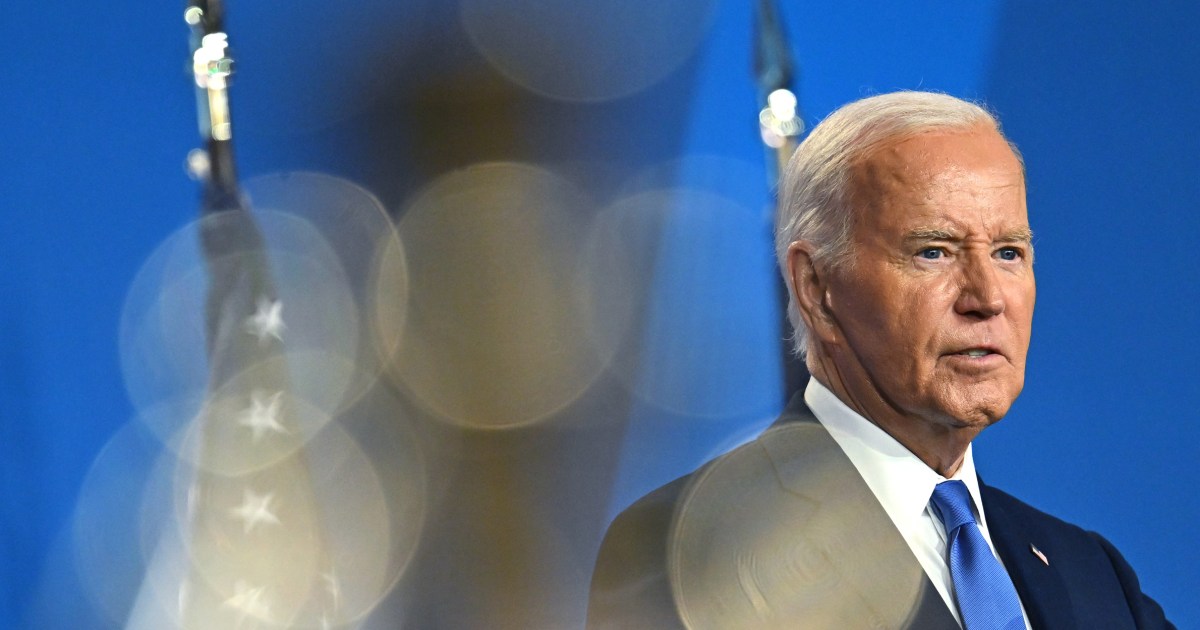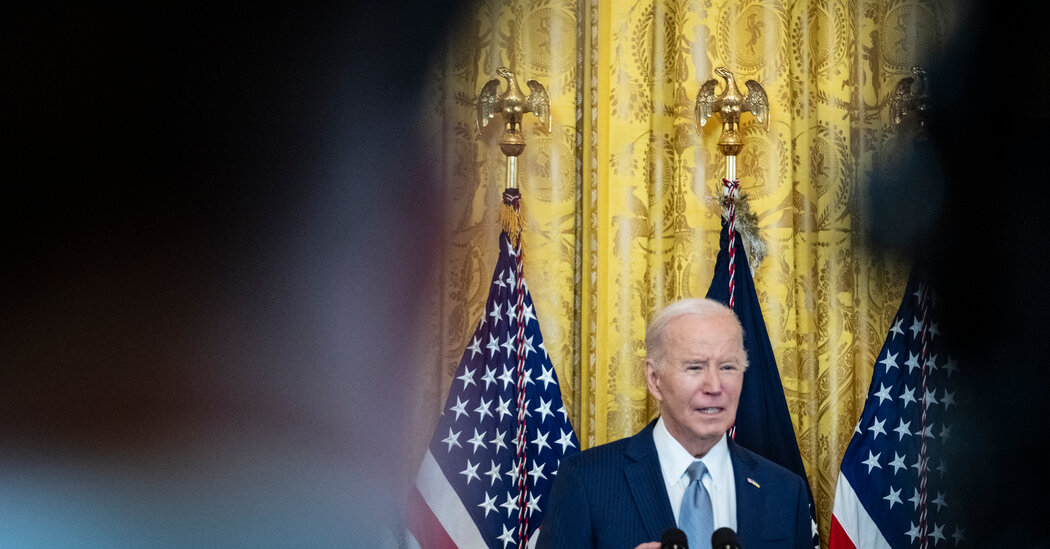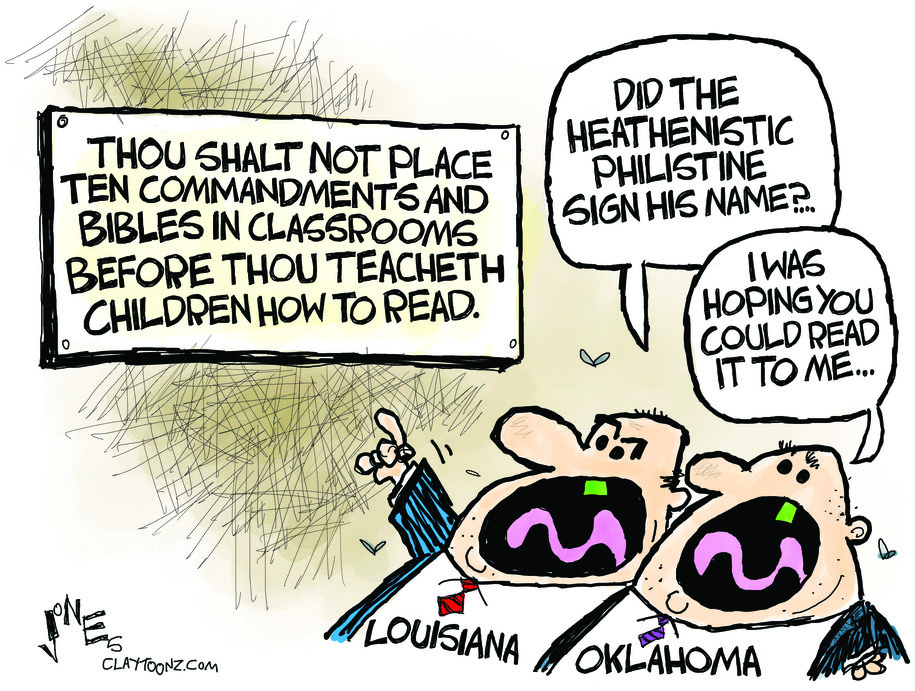Surrounded by a handful of trusted advisers and first lady Jill Biden at his vacation home on the Delaware coast Saturday evening, President Joe Biden reflected on a political career that spanned more than half a century and began to conclude that it would reach its end earlier than planned, according to people familiar with his decision.
Isolated, frustrated and angry, he felt betrayed by allies who turned on him in his hour of need.
“He’s really pissed off,” said a person in touch with Biden’s inner circle.
Mad as he was — and still is — Biden came grudgingly to accept that he could not sustain his campaign with poll numbers slipping, donors fleeing and party luminaries pushing him to exit. He may have been slower than other Democratic insiders to make that calculation, but he fully understood it by Saturday night.
The account of this critical weekend, and what led to Biden’s stunning announcement, came from interviews with two dozen Democrats familiar with what transpired.
In separate phone calls Sunday, Biden told his vice president, Kamala Harris, his White House chief of staff, Jeff Zients, and his campaign chair, Jen O’Malley Dillon, that he would abandon his re-election bid. The fact that he had to inform them in such a manner underscored the degree to which his circle had tightened in recent days to family members and a few longtime aides and advisers — Mike Donilon, Steve Ricchetti, Anthony Bernal and Annie Tomasini.
The outcome may not have surprised White House and campaign officials, but the timing did. Most found out, along with the rest of the world, when Biden published his post on X. The same was true for Democratic National Committee officials and state party chairs. Senior Biden aides scrambled to set up separate meetings to talk to staff members for the White House and the campaign, reassuring the political aides that their jobs were safe.
As it always is, the end was abrupt. But it came after a hellish 25-day stretch sparked by the most disastrous debate performance in modern American political history on June 27. Biden failed to reassure fellow Democrats — or enough of them — in follow-up public appearances. Major donors cut off money to his campaign and the party. In drip-drip-drip fashion, elected officials started to call for him to drop his bid. Former House Speaker Nancy Pelosi of California, the godmother of the Democratic Party, said he still had a decision to make — after he insisted he had chosen to stay in the race.
There was less light than darkness on the horizon.
On Saturday, he spoke with Pelosi — a conversation her office denied — CNBC reported, citing a person with direct knowledge of their interaction. Pelosi, whose top close allies publicly called for him to leave the race as she stopped just short of that in recent weeks, did not respond to a text message seeking comment.
Senior Biden aides expected that Senate Majority Leader Chuck Schumer and House Minority Leader Hakeem Jeffries, both Democrats from New York, were likely to publicly call for him to step aside after his meeting with Israeli Prime Minister Benjamin Netanyahu this week.
Biden also met with Donilon and Ricchetti on Saturday. They went through “literally everything” — including bleak polling in battleground states — about his possible path forward, according to sources, but the two trusted aides did not make any recommendation about what he should do. Their sense was that Biden had already made up his mind to withdraw and that that discussion cemented it. Still, they all decided to sleep on it.
On Sunday morning, they met again, keeping everything incredibly tight to prevent leaks.
On Thursday, former White House chief of staff Ron Klain, who wanted Biden to stand firm, said Biden was “feeling the pressure.” On Friday night, according to the person in touch with his inner circle, he still had not changed his mind.
Friends had told him that he was risking his legacy — as the man who defeated Donald Trump and enacted a series of major laws — and could end up becoming a scapegoat if Democrats get clobbered in November. He still believed, up until this weekend at least, that he could win again. In 2020, he had promised to be a bridge candidate. In the end, he did not want to be a bridge between two Trump terms.
“It became a no-win situation, a self-fulfilling prophecy,” former White House official Cedric Richmond, who was a co-chair of Biden’s 2020 campaign, said Sunday. Once money dries up and elected officials pull their support, “it’s impossible to win, and he’s always put country and party first.”
By the time Biden convened a call with his full complement of senior advisers at 1:45 p.m. Sunday, an official statement announcing his decision had already been written. One minute later, his X account posted that statement, telling the public that he would remain in office but cede his party’s nomination — making him the first eligible incumbent president to do that since Lyndon Johnson in 1968. Less than 30 minutes after that, he endorsed Harris, blessing her as the best choice to beat Trump in a four-month sprint to Election Day.
After his announcement, Biden made 40 to 50 phone calls about his decision Sunday night, according to sources.
In recent days, as calls for him to step down mounted, Biden asked to see polling his campaign had solicited on how Harris would fare in a hypothetical matchup against Trump, according to two people familiar with the matter. They said he also reviewed public polling as he wanted to know more about her standing against Trump. The Harris polling was very tightly held, and it circulated to only a handful of top campaign aides, including Donilon and O’Malley Dillon, the two people familiar with the matter said.
Biden’s call appeared to hinge entirely on political factors, rather than concerns about his health or his ability to do his job. A senior administration official said that there was no new medical information informing Biden’s decision, though he had said himself recently that he might reconsider his candidacy if “some medical condition” emerged.
“If doctors came to me and said you got this problem, that problem,” Biden hypothesized in an interview that aired last week.
While his doctor has monitored Biden in recent days for a Covid diagnosis and did bloodwork related to it, Biden has not undergone any extensive tests or medical examinations in recent days, the official said. His last comprehensive physical was in February.
In affirming that he will remain in office, Biden implied that he is not worried that he can carry out the presidency.
Across the country, Democrats scrambled to respond — and prepare for a future without Biden on the ticket — in the minutes and hours after his announcement.
In Minnesota, Democratic Party chair Ken Martin was preparing a Biden open house in Minneapolis when he heard the news reports. In Illinois, a delegate had just received a phone call from the Biden campaign, asking whether Biden would still have their support in a convention vote. The news of Biden’s withdrawal came just an hour later.
Once he found out, Martin got on the phone with other state party chairs and advocated for the next step: have a unified stance within the party to back Harris for president.
“Everyone I’ve talked to right now agrees that we have to unify quickly,” said Martin, who organized a conference call with state party chairs Sunday afternoon. “The idea of having four weeks of turning the conversation inward is not something I’m particularly excited about. The quicker we can unify our party behind a ticket, the sooner we can get this campaign moving.”

An integral member of Biden’s re-election team found out after a family member read a news alert. The person noted how everyone around Biden was taken by surprise, particularly after some of Biden’s closest allies were on Sunday shows pushing for his candidacy.
“No one knew. Kamala didn’t even know,” the person said.
Harris made her own round of phone calls Sunday as many party leaders tried to ensure that she would face few obstacles to winning the nomination. In addition to Biden, she won endorsements from former President Bill Clinton and Hillary Clinton, who was the party’s 2016 presidential nominee.
Several prominent Democratic governors, including California’s Gavin Newsom and Pennsylvania’s Josh Shapiro — both considered possible future presidential candidates — threw their support to Harris on Sunday. So did a variety of outside groups that are important to Democratic electoral prospects at the presidential and congressional levels.
Biden did not want Harris to experience the same betrayal he felt when he was vice president and President Barack Obama put his weight behind Hillary Clinton instead of his own running mate. That helps explain why he was quick to send a signal to the rest of the party that she is his choice.
“There are some people who don’t want her. The president understands how that feels,” a Biden ally said, “which is why he did the loyal thing.”
Even as they began laying the groundwork for Harris to take over Biden’s campaign and win the nomination, many Biden loyalists in Washington were still stewing Sunday about the way their party treated him.
“Here is a man who has always talked about dignity,” a longtime Biden ally said. “And what was happening to him in a very public setting was undignified. Where does the president go to get his dignity back?”


